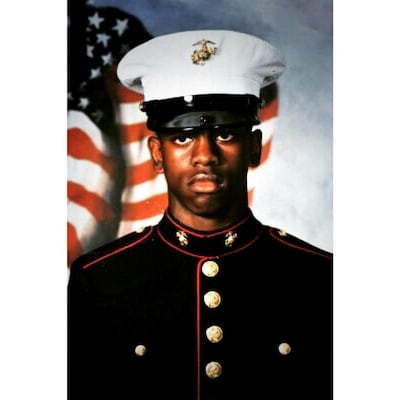Jamel Herring remembers his first time he flew into the Middle East. He was a 19-year-old US Marine off to Iraq and as the plane came in to land, he had a genuine concern that it could be shot down
Sixteen years on, Herring is in Dubai where he defends his WBO super-featherweight title on Saturday against Carl Frampton at Caesars Palace.
“This is definitely a change, a good change,” Herring said. “It was nerve-wracking because you just didn’t know what to expect. My big fear was the thought of being shot out of the sky.
“I saw a lot of roadside bombings, I even had an incident when an RPG [rocket propelled grenade] flew over my head. I thought I was seeing things before I heard the explosion go off in the background.
“I would rather be in the desert in peacetime rather than war time. Growing up I had never experienced anything like that. It makes you more mature and makes you appreciate the things you have in life.”
A native New Yorker, he was motivated to sign up in the wake of the 9/11 attacks prompted by a desire to serve his country.
“I was junior year in high school,” he said. “I had friends who had relatives who worked at the World Trade Centre, so it was scary seeing what they went through. Being a kid, I just didn’t know how to take it all in.
“My closest friend in high school, who graduated before me, signed up for the Marine Corps. The 9/11 attacks definitely played a big part.”
As well as two tours of Iraq, it saw Herring join the US Marine Corps boxing team, following in the footsteps of some illustrious names including Ken Norton and Leon Spinks, two world heavyweight champions who beat Muhammad Ali.
That in turn led to the 2012 Olympics in London, where he was named boxing team captain. It proved to be a tough tournament. Two women won medals, but none of the men, leading them to be labelled the worst American boxing team in history.
“We were marked as the Olympic team that didn’t medal at all,” Herring said. “You had amateurs, who I had beaten, but because they were not on that Olympic team, they weren’t judged by it. I’m an Olympian but I still had to start from scratch.

“It’s a lot different from Pernell Whitaker, Evander Holyfield and those guys. There was no celebration for us coming home. We had to start from ground zero, to grind and move our way up.
“I wasn’t expected to win a world title, but I took that as motivation. I always see myself as the underdog. I think it is up to you to prove others wrong and you can write your own story.”
There were setbacks along the way as a professional, but Herring became a world champion in 2018, beating Masayuki Ito, of Japan, on points. This will be his third defence of the title, although Frampton, a two-division world champion from Northern Ireland, is a step up in class
Herring, though, has a size advantage. He boxed as a light-welterweight as an amateur, while Frampton has competed for most of his career as a super-bantamweight, four divisions below.
“We met in November 2019 and they thought I was 30 pounds over the limit, but I was actually already at a good weight,” he said. “The size difference was noticeable, but while I might be bigger, I give him the respect because Carl has a lot of experience and championship fights. Carl is definitely the biggest name I have come up against.”
They should have initially met in Belfast, Frampton’s home city, last summer, but the pandemic intervened. Herring then fell ill with Covid and the fights was most recently pushed back from last month in London because Frampton had a hand injury.
Herring is expecting a difficult night, but no matter how tough it gets, he has his US Marines training to fall back on. Nothing he experiences in boxing is as hard as that.
“I owe being mentally tough to the Marine Corps because I have been in some tough scenarios and nothing can compare to that in the ring,” he said. “When I am having a rough day, I think about how far I have come as an individual.
“I love boxing. I loved my military career, but if I can get home safely to my family every night, I will take that every day.”



